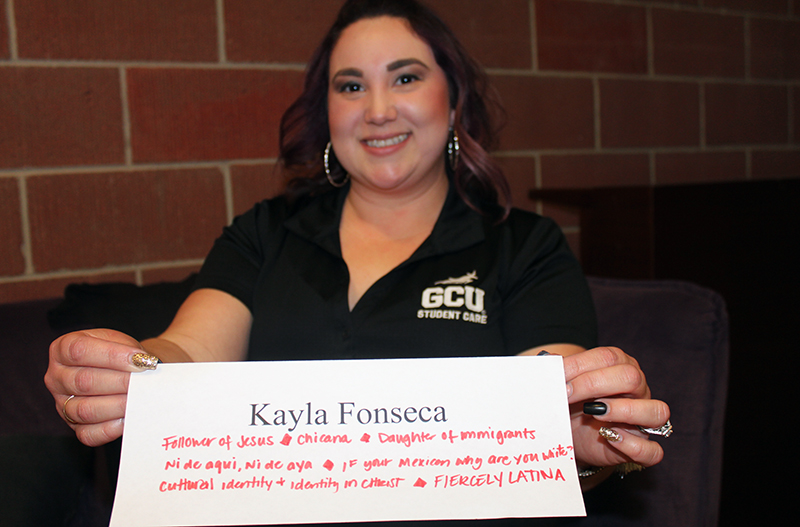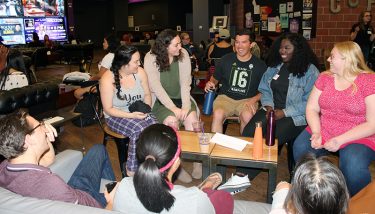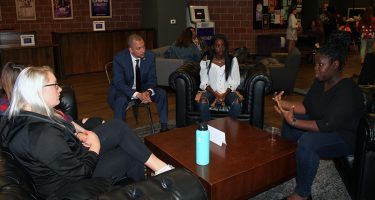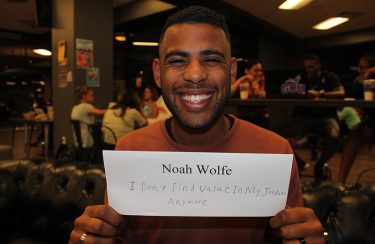
By Jeannette Cruz
GCU News Bureau
Like books, people have stories, too.
But not everyone tells their story, and we don’t always ask.
On Thursday, the "Human Library" project, spearheaded by the Associated Students of Grand Canyon University, provided a safe and positive space where students and staff could challenge stereotypes, share their stories and strengthen understanding among people with different stories and backgrounds.
Student volunteers and staff were living books, available for checkout who would engage visitors around personal journeys. And the crowd turned out in large numbers.

Among the book titles included "Intelligence and Accents," the story of how student Gabi Lee grew up in a family of Singaporeans and Taiwanese with an Australian accent; "I Don’t Find Value in my Jordans Anymore," the story of Noah Wolfe’s identity crisis; and "World Traveler," an individual’s transformational experience while traveling to 36 countries.
In choosing to participate in this event, Kayla Fonseca, Administrative Assistant to the Dean of Students and Student Care, said she wanted to promote awareness and inclusivity on campus. She talked about what being Mexican-American and the daughter of immigrants meant to her.
“When we dismiss these topics we miss out on diverse humanity that God created,” Fonseca said.
“I love my culture. I love the music. I love food. I wish I would have brought Pan Dulce (sweet bread) with me,” she told visitors. “You see, in Mexico it’s not a question of, ‘Do you want some?’ It’s ‘How much do you want?’”
Luke Amargo, honors program manager, took over the spotlight to tell the story of family structure and values in his Filipino family. He blew visitors away with a special fact – he has 33 first cousins. They also talked about history, poverty and Filipino foods, including cheese ice cream and Pandesal – a popular dinner roll.
Lee said that by having a dialogue, she hoped she would lead readers to think, “Just because people have an accent doesn’t mean they are less intelligent.”

“It’s interesting because I grew up speaking English and Mandarin, and in the third grade I moved from California to Australia. At first, people there thought I was strange because of my American accent, so immediately I had to adapt and I got to form an Australian accent – which was great because I had to fit in. When I moved back to California years later I had an Australian accent, so again, I went through the same struggle of people thinking I was weird,” she said.
“Then my mom had an Asian accent and people assumed she was slow because she didn’t speak proper English. That was disheartening. It’s also funny because Asians are also stereotypically smarter and yet with our accents there is a weird battle. It’s something that happens with all nationalities.”
Junior Megan Ryan spoke about the challenges she faced within her family when she converted to Christianity. She was raised Jewish.
“There are differences between us still, but what this experience has taught me is the need for people to embrace differences and to find similarities among each other,” she said. “I love people’s willingness to be here to listen.”

Wolfe, next year’s student body president, concurred.
“We live in a world that doesn’t take the time to encourage or get to know the individual. Life is moving so fast and we don’t take the time to slow down,” he said.
Wolfe shared his experience of adoption and spending a large portion of his life in two very different social classes.
“I think it can be really easy today to associate ourselves with a certain group or a certain culture,” said Wolfe. “There came a day when I realized that the clothes that I wear or the food that I like and the music I listen to doesn’t define me. I realized that my value comes from the content in my heart, my character and who God’s called me to be made me so much more confident. I started having an identity crisis because I felt like I didn’t fit in either environment that I went to.”
At least eight living books shared their stories to make diversity the center of their concern.
“All of these speakers here tonight have had experiences that need to be spoken about,” Lee said. “The more we can have these open discussions, the easier society can get.
"It’s about being able to relate to make the world right. Even though we are different somehow, we’re also still the same.”
Contact Jeannette Cruz at (602) 639-6631 or [email protected].



































































